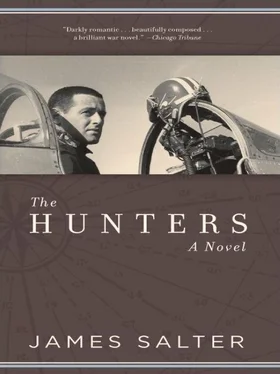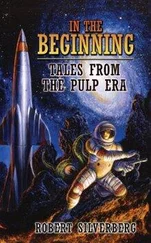“You really think he’ll get the flight?” Kiser said. “That would be something.”
“He’d be a mean one to try and beat. He’s a smart operator. Wait until you get to know him some.”
“He looks mean,” Schramm said. “I notice he’s smoking on those cigars all the time.”
“All fighter pilots smoke cigars,” Hunter said.
In June came ponderous heat and mornings like eggshells, pale and smooth. Perhaps there might be a bit of early wind, warm but tantalizing, that was never repeated throughout the day. The heat was tremendous. It made the feet ache and clothes feel like abrasive. Even sheets were hot, concrete floors and water pipes. There was no place to go to escape it. The days were interminable. But the mornings, the eternal mornings! They were dawns of doomsday, already burned to transparence while still beyond the horizons over which they came. The mind was threatened by their emptiness. The face wrinkled instinctively against them. They were silent, like the dawns over vast sleeping millions, perfectly still, threatening, deathful. In their silence, premonitions bred like vermin, while red as a tomato the sun rose from behind the eastern hills, throwing down thick blankets of heat.
It was on such a morning that the first-light reconnaissance, which flew along the Chinese border visually checking the enemy fields, returned to report an awesome display. The strips were jammed with aircraft, a rash of silver MIGs strewn as thickly as pebbles on a shore. They had counted almost seven hundred of them, parked wingtip to wingtip.
“I knew it,” Colonel Imil affirmed. The news reached him at breakfast. “I knew it.”
“What’s up?” Moncavage asked.
“They saw seven hundred MIGs up north this morning.”
“Holy fish! What’s going on?”
“They’re loading up. They’ve been tipped off somehow.”
“Tipped off to what?”
“I’ll tell you later. Let’s get down to the line.”
They hurried off to combat operations, firing volleys of conversation at each other in the jeep. When they arrived, Moncavage knew.
“Only the best people today,” Imil was saying as they strode in.
“All right.”
“I want the cream of the group. This is the one, Monk. I can feel it. Seven hundred of them, by God! They’re going to fight.”
He was on the telephone direct to Fifth Air Force minutes later. It was not a good connection. His shouting into the mouthpiece could be heard all through the building.
“Listen, this is Imil. Our visual reccy flight just landed. What? Visual reccy. Yes, it just got back. They counted seven hundred MIGs up there. That’s right. Yes. You goddamn well better. No, it’s not here yet. Well, we’ll be looking for it. Sure, sure, you bet. Sure.”
He hung up and sat there, looking at Moncavage.
“Seven-thirty,” he announced, consulting his watch. “They say the ops order will be here within two hours. A special courier is bringing it.”
Moncavage puffed at a cigarette.
“Maybe I’d better start calling the squadrons.”
“No,” Imil said, “not yet. Don’t get them keyed up. There’s plenty of time.”
“Do you want to wait in my office?”
“Let’s wait right here. I want to open that envelope myself.”
By eight, the pilots in the mess were talking about it. A fever mounted on the field, ominously, like lead melting. There were clusters of men everywhere discussing it—in the latrines, along the road, and out on the line. Something big was coming up. The level of excitement was rising like flood waters. All missions had been called off until further notice. Nobody knew more than that for certain.
At 1130 Hunter came bursting into the room. He looked about quickly.
“Where’s Cleve?”
“What have you heard?” Pell said.
“They want everybody down in the briefing room in fifteen minutes. The whole group.”
“Even the new sports?” He nodded toward Kiser and Schramm.
“Everybody, they said.”
“Do you know what it is yet?”
“No,” Hunter said. “Where’s Cleve?”
“Who cares?” Pell stood up. “Let’s go, men. You, too, Petti.”
Hunter stayed behind. He ran from room to room. They were empty. Everybody had gone. After what seemed like ten minutes, he located Cleve sunning himself behind the barracks. There was another wait while Cleve got dressed. It was a quarter to twelve before they left for operations. All the vehicles had gone already. They had to walk.
They arrived ten minutes late. The whole group was already there. The briefing room overflowed. There were not enough seats for all of them; pilots were standing up in the back of the room. Colonel Moncavage was prowling the center aisle checking for complete attendance. He looked toward them as they entered.
“Thanks for coming, Connell,” he said. Heads turned.
The room was baking hot. As the minutes dragged by, restlessness grew. There were coughs and the sound of matches being struck. Thickening smoke made the air even more unbreathable. At 1215 the colonels were still talking earnestly to each other in the front of the room. Cleve stood looking through the blue haze at the map forty feet away. He squinted his eyes but could not make out anything written on it. The schedule board, too, was blank. Nothing was up there except the familiar, laconic sign at top center of the wall: The Fighting Heart. With posed, disinterested expressions the pilots waited. Finally, Colonel Imil stood up and walked toward the low platform. He stepped up onto it.
“Well, boys,” he said. It became perfectly silent. “This is the one we’ve all been waiting for. This should be the biggest one of the war.”
He paused. Cleve could feel his heart beginning to pound. His thoughts leaped sickeningly. The biggest one. A strike against Antung. The fields north of the Yalu. That was the first thing that came to him.
“The joint chiefs in Washington,” Imil continued, “have finally given the green light. Today, we’re going after the dam at Sui Ho.”
There was a hum of recognition. The target was on the Yalu itself.
“That’s the fourth biggest one in the world, with the second greatest output of power,” Imil said. “We haven’t touched it up until now. Too hot, I suppose; but it’s finally been approved. Every fighter-bomber in Fifth Air Force is going up there today, right across the river from the MIGs. They’ll be able to see the smoke from their fields, and they’ll be coming up, too, all of them, to stop us. You can count on that. I don’t have to tell you who’ll be leading them, either. You know as well as I do. He’ll be there. You can bet your life on it. Our job is to get those fighter-bombers in and out, and that’s what we’re going to do. Every ship that can fly is going. Do you have the numbers from the squadrons yet, Monk?”
“Right here.”
“Read them off.”
Moncavage announced the totals for each squadron: twenty-two planes, eighteen, and twenty. He gave a list to one of the operations officers who copied it onto the scheduling board, number by number. Then each squadron supplied the names of the pilots who would go, and they, too, were written down. Cleve watched as the eighteen blanks for his squadron were filled. The squadron commander was leading the first flight, with Pell and Pettibone as his element. Gabriel and three from that flight were next; then the operations officer, Nolan, and three from his old flight. At the very bottom, posted beside the two ships that made up the odd element, Connell and Hunter. It took only a few minutes until the list for the entire group was complete. The takeoff times were being written in.
“All right,” Imil said. “Weather.”
Читать дальше












